The 2nd Sino-French Seminar on Higher Engineering Education was held at DGUT on April 28. The seminar was co-hosted by DGUT and CNAM, and co-organized by the Sino-French Alliance for Higher Education Development Cooperation and Beihang University, with members of the Sino-French Alliance participating in the seminar in an “online (main) + offline (supportive)” model. With “Promoting Sino-French Exchange and Cooperation to Train Outstanding Engineering Talents” as the theme, the seminar saw scholars and experts from China and France focus on Sino-French joint education, discuss new opportunities for exchange and cooperation, and the future of higher engineering education between China and France, with the aim to further deepen the pragmatic cooperation between China and France and cultivate outstanding engineering talents in the new era. The one-and-a-half-day seminar consisted of 3 keynote speeches and 15 speeches on the seminar’s topics.
Fu Bo, Deputy Secretary-General of China Education Association for International Exchange, Li Jinjun, Director of the Exchange and Cooperation Office of the Department of Education of Guangdong Province, Alain Sarfati, Acting President of CNAM, Huang Haijun, Vice-President of Beihang University, and other guests attended the seminar. Cheng Hongbo, Secretary of the Party Committee of DGUT, delivered the opening speech. Ma Hongwei, Deputy Secretary of the Party Committee and President of DGUT, delivered a keynote speech. Yang Minlin, member of the Party Committee and vice-president of DGUT, presided over the opening ceremony.
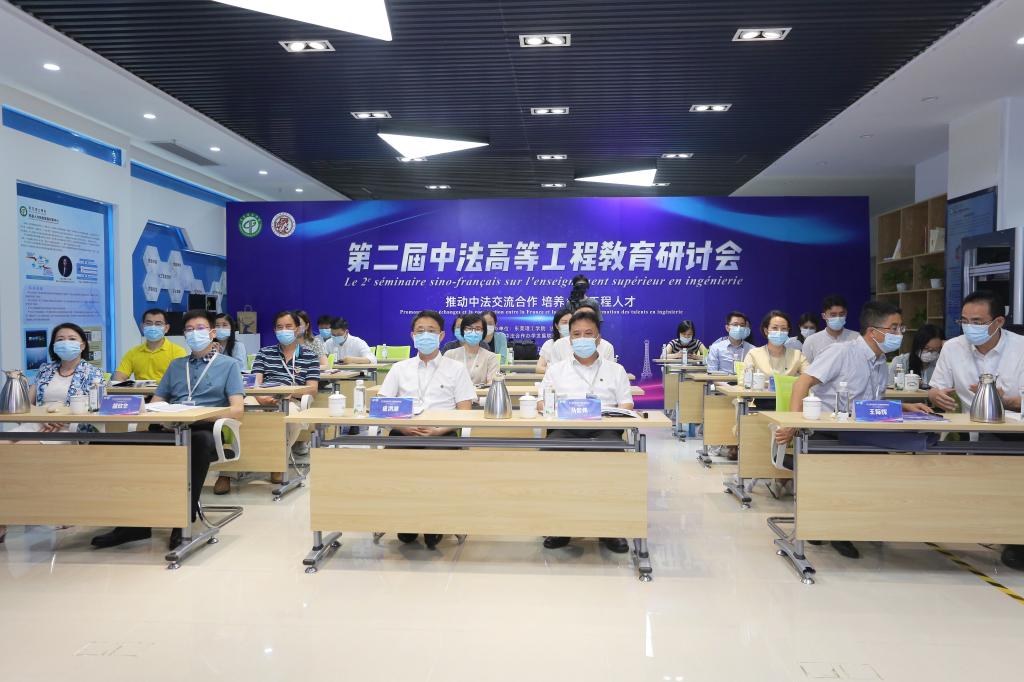
During the seminar, Cheng Hongbo said that DGUT’s explorations and practices related to the reform of higher engineering education is an important case for building a powerful country in engineering education in China. The DGUT-CNAM Institute was established in 2017 with the approval of the Ministry of Education of PRC, to strengthen Sino-French engineering education exchanges and cooperation, and to learn from the advanced experiences of French higher engineering education. Leveraging the strong platform of the Sino-French Alliance for Higher Education Development Cooperation, the seminar promoted mutual learning and cooperation. The seminar can further strengthen the unique role of Sino-French cooperation in the reform of higher engineering education and the innovation and development of high-grade, precision, and advanced technologies, promote the steady and long-term cooperation in higher engineering education, and deepen the cultural exchanges and comprehensive strategic partnership between China and France. DGUT will take advantage of this precious opportunity to learn from the valuable experiences of our peers, further enhance the internationalization level of our education, and expand the achievements of our new engineering discipline development.
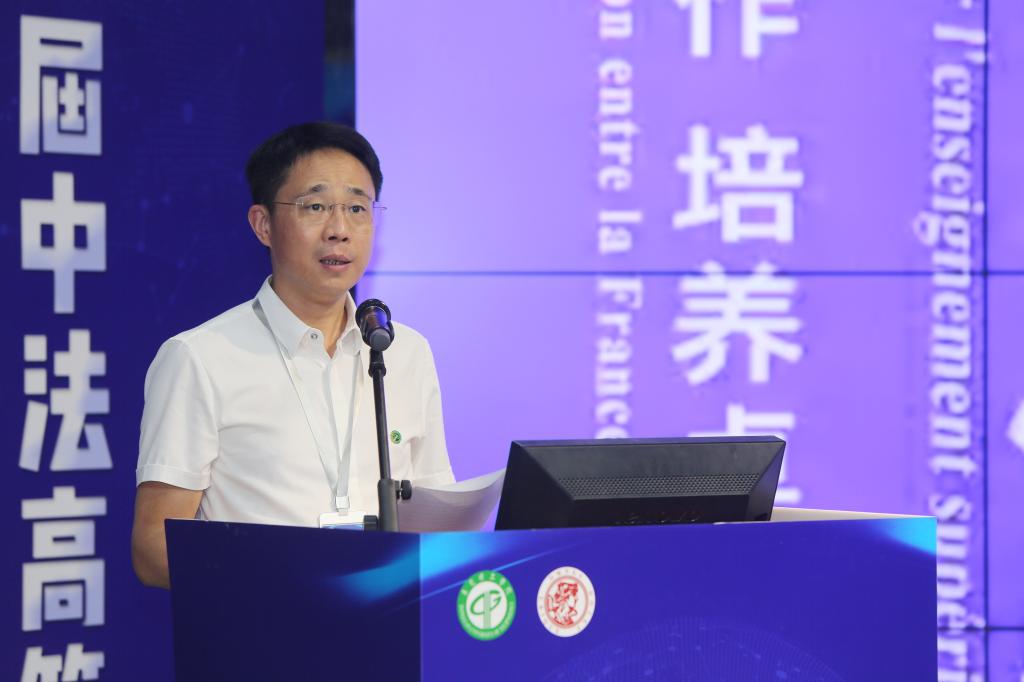
In his speech, Alain Sarfati pointed out that the cooperation between China and France in higher education has achieved impressive results and has been widely recognized. Both sides are eager to continue to strengthen cooperation, share knowledge, and develop common values. The 2nd Sino-French Seminar on Higher Engineering Education provides a new opportunity to explore the training of international engineering talents in the post-epidemic era and to work together to cultivate more engineering talents to improve the friendship, economic and trade cooperation, and humanistic exchanges between France and China.
Fu Bo remarked that the seminar’s theme—“Promoting Sino-French Exchange and Cooperation to Train Outstanding Engineering Talents,” matched the common concerns of China and France at the present stage. We expect universities in China and France to make joint efforts to play a leading and supporting role in discipline integration, industry-driven development, knowledge structure development, evaluation mechanism, and international standards. We should further learn from each other, strengthen cooperation, comprehensively leverage our advantages in high-level talent training and scientific research, and better serve sustainable development. China is ready to deepen cooperation with France at all levels to jointly train high-level talents and provide more intellectual support for the realization of a better future for the two countries and the building of a community with a shared future for mankind.
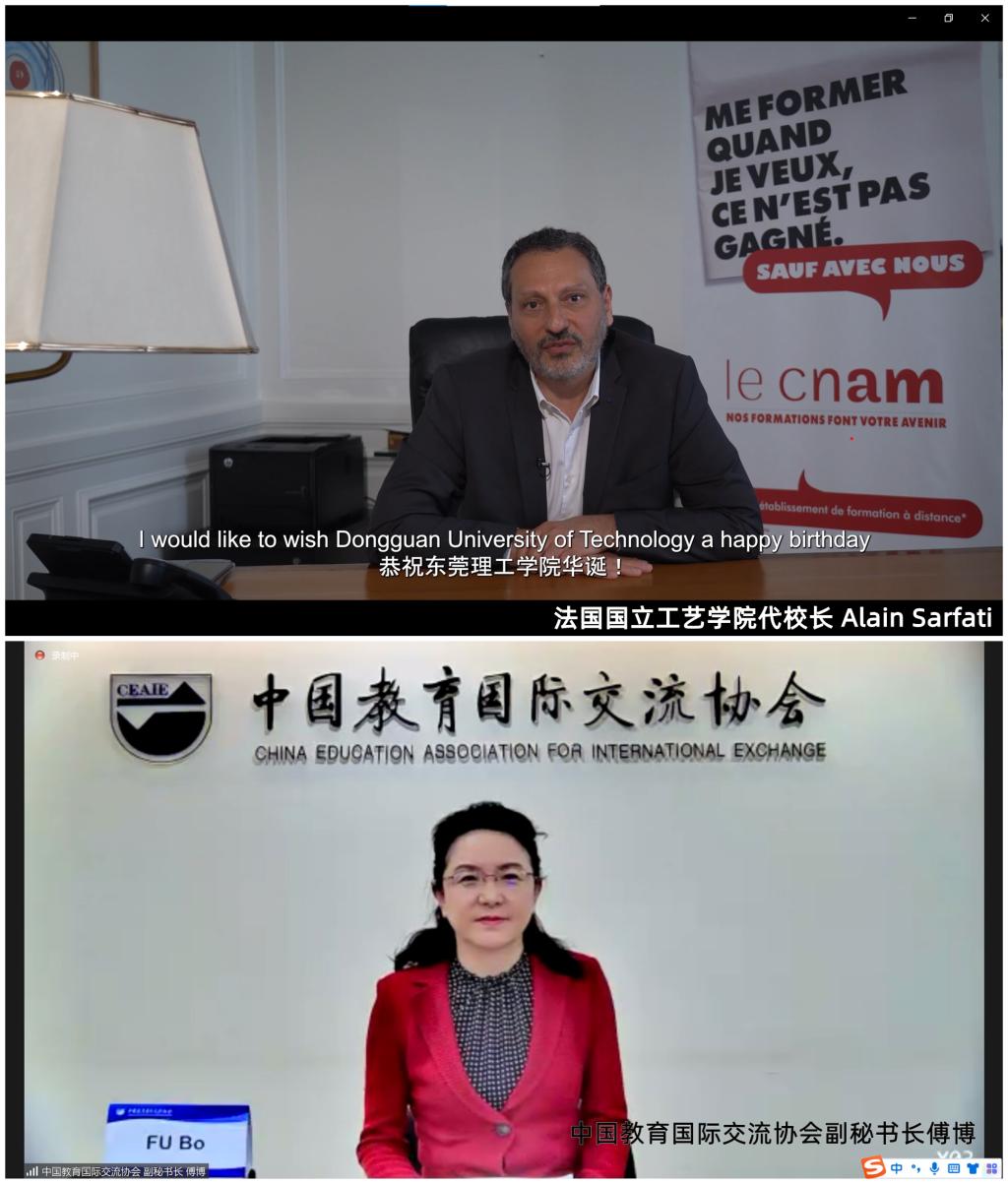
Ma Hongwei delivered a keynote speech titled “Make Unremitting Endeavors to Create a New Future—Initiatives for Internationalization of a Local University,” wherein, he introduced the basic information about DGUT, summarized the current situation of its internationalization efforts, and shared the achievements and experiences of joint education of the DGUT-CNAM Institute. MA pointed out that under the unprecedented ever-evolving environment, local colleges and universities should proactively respond, do a good job in co-existence and co-prosperity with urban industries, practice local internationalization efforts and focus on opening-up higher education. DGUT is equipped with the genes, environment, conditions, and path to become an international university, and has the confidence to become a model university in terms of internationalization of local colleges and universities, within 10 years.
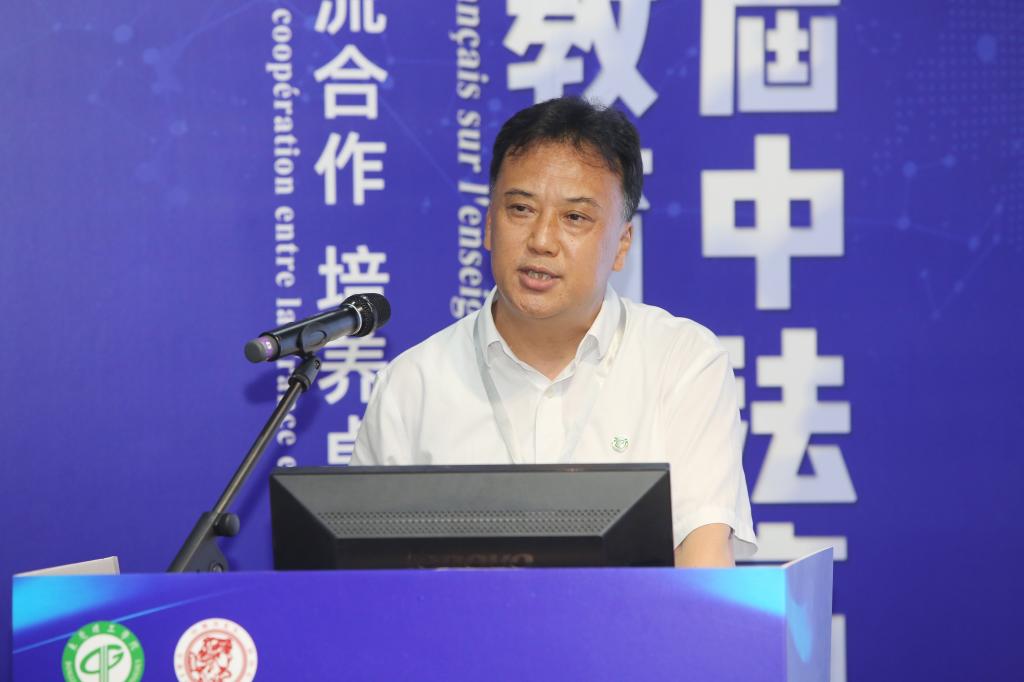
Huang Haijun delivered a keynote speech titled “Training of International Outstanding Engineers—Practice and Development of Sino-French Joint Education,” wherein, he introduced the new model of international outstanding engineer training represented by the Sino-French Engineer School of Beihang University, summarized the featured “GEESE mode” of Beihang University, and put forward four facts about the development of international outstanding engineer education, which are worth considering. In addition, he added that we should have a strong sense of responsibility and mission and continue to search for answers on how to complete the development of the practical independent training system for outstanding engineers in colleges and universities.
Li Jinjun delivered a keynote speech titled “Adhere to the Opening up of Education and Promote the Cooperation and Development of Education in the Guangdong-Hong Kong-Macao Greater Bay Area,” wherein, he first introduced the status quo of higher education in Guangdong province and the goal of “building a new pattern of education opening and cooperation” in the 14th Five-year Plan of education development in Guangdong Province, and put forward some ideas on promoting the development of education cooperation in the Guangdong-Hong Kong-Macao Greater Bay Area. Li added that the Department of Education of Guangdong Province will continue to encourage and support educational exchanges and cooperation with France. In the process of strengthening mutual tolerance, mutual learning, and communication with other countries in the world, the Department of Education of Guangdong Province is also actively participating in global education governance and regional education cooperation and making positive contributions to promoting the construction of a community with a shared future for mankind.
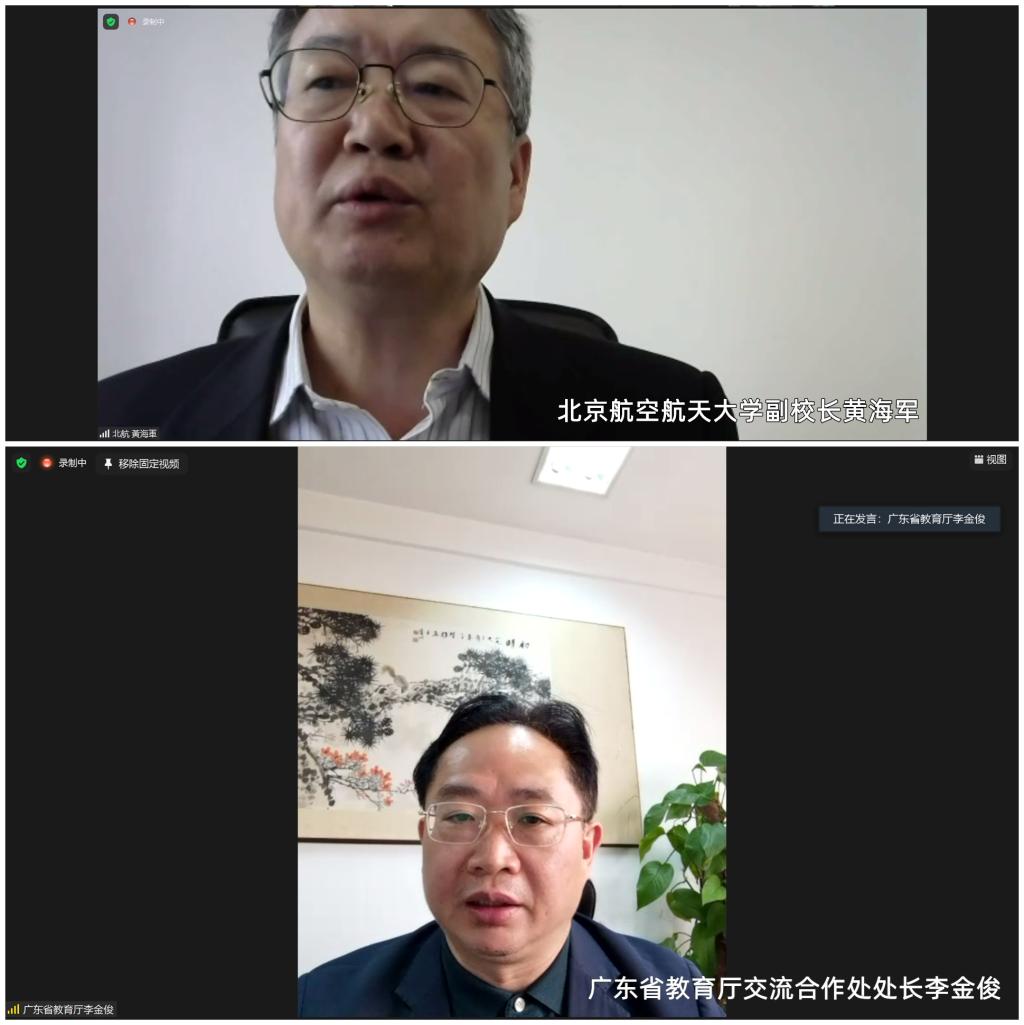
Following the keynote speeches, Frederic Genty, the French Dean of the Sino-French Engineer School of Beihang University, Geng Yinggang, Deputy Secretary of the Party Committee of the WUT-AMU Institute, and Frederic Toumazet, Dean of the SJTU-Paris Elite Institute of Technology, gave speeches on the seminar’s topics.
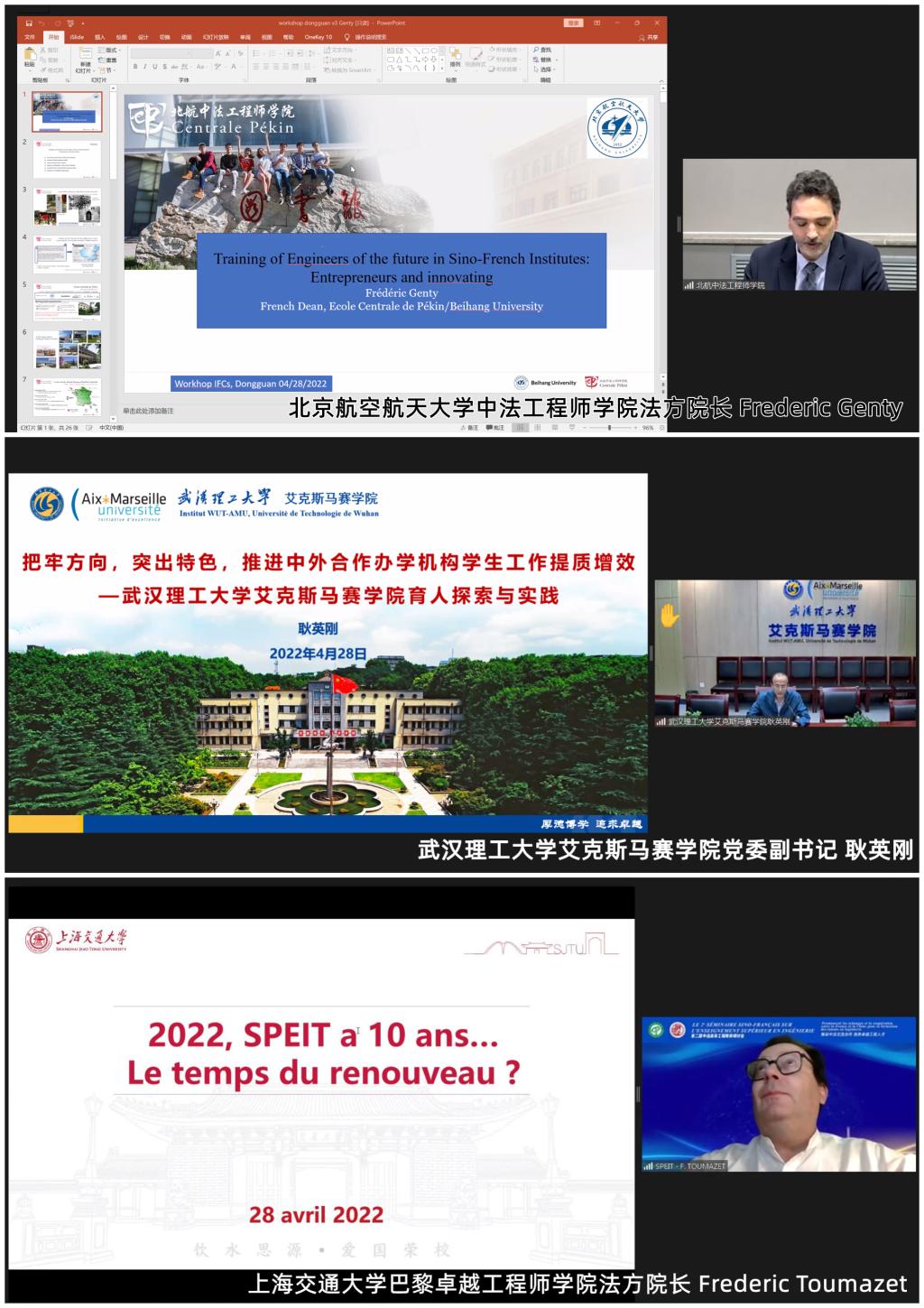
On April 29, relevant representatives of the Sino-French Engineer School of Beihang University, the SJTU-Paris Elite Institute of Technology, the China-EU Institute for Clean and Renewable Energy at Huazhong University of Science and Technology, IFCEN, the Paris Curie Engineer School, BUCT, the Sino-French Engineer School of NUST, the International Joint Audit Institute, NAU, the Sino-European Institute of Aviation Engineering, and DGUT-CNAM Institute delivered 12 speeches on the seminar’s theme and topics.


![]()